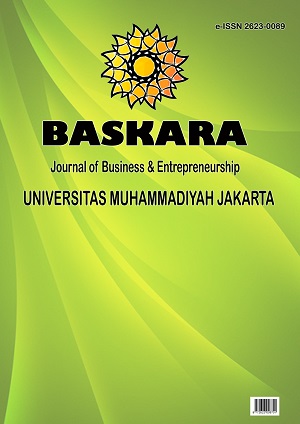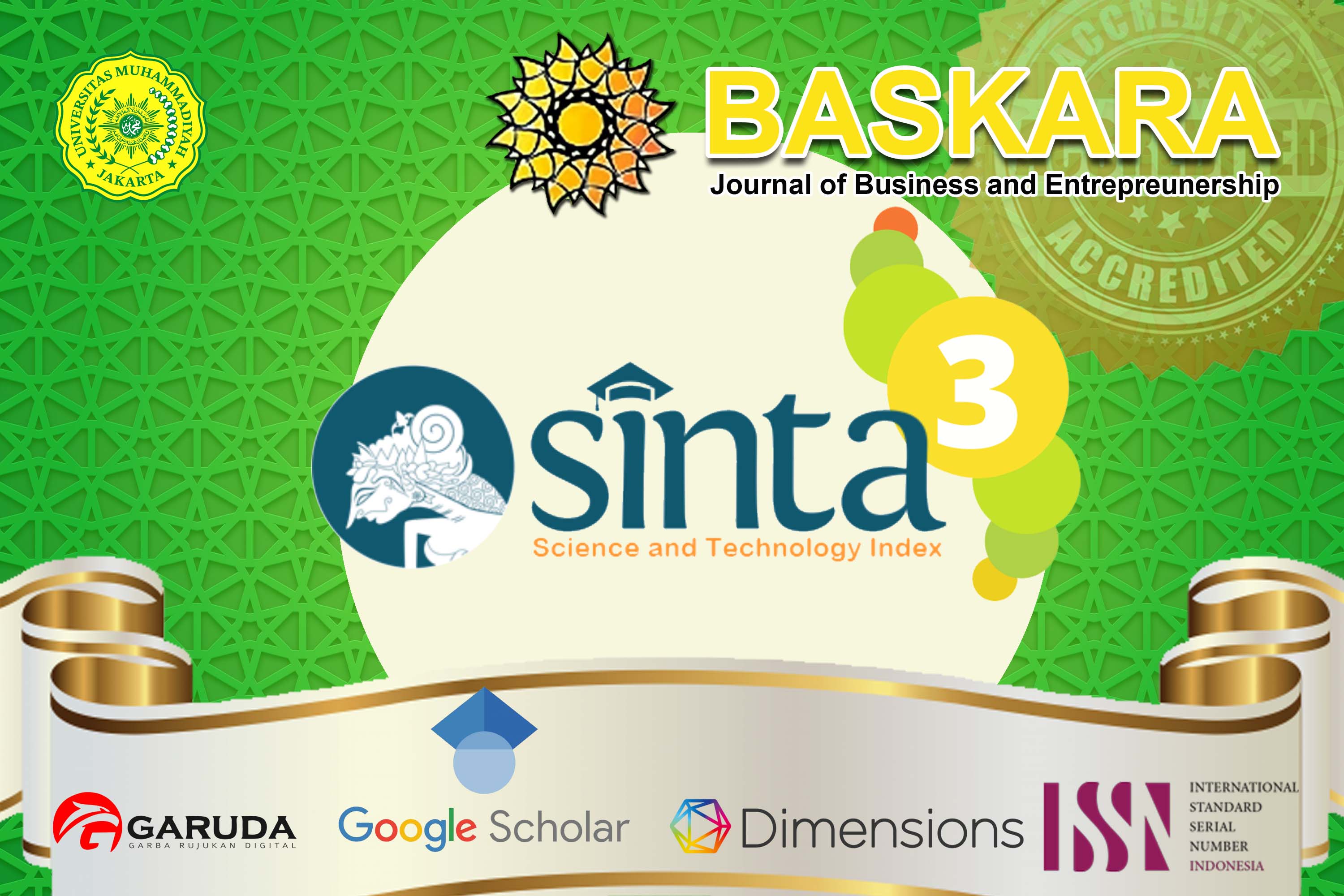The Urgency of Indonesian Islamic Fashionpreneur as Part of The World's Halal Industry
DOI:
https://doi.org/10.54268/baskara.v4i1.10013Kata Kunci:
Islamic Fashion, Fashionpreneur, Halal IndustryAbstrak
Indonesia is a country that has great potential to become the center of the world's halal industry. This is analogous to the largest Muslim population, and Indonesia is ranked fourth in the development of the sharia economy. On the other hand, this is also analogous to people's consumption patterns for clothing or fashion needs that are always evolving, and become part of human secondary needs. That way, we can maximize efforts to make Indonesia the center of the halal industry in the world, especially in the field of Islamic fashionpreneur. Currently, there are many Muslim fashion start-ups and Muslim fashion designers born in Indonesia. This is in line with human desire for an elegant style to beautify their appearance and increase their self-confidence. Based on the data and the reality on the ground, Indonesia has a huge opportunity to become the center of the world's halal industry through Islamic Fashionpreneur. Obstacles in Indonesia's development to become the center of the world's halal industry through Islamic Fashionpreneur, among which are raw materials that are difficult to obtain or cannot be provided domestically or still have to be purchased or imported from other countries. Besides, on average, most Muslim fashion craftsmen still use traditional technology and can be said to be "less up-to-date", plus the problem of being in the field of Islamic Fashionpreneur or just making it a hobby or filling spare time. Therefore, in this study using a qualitative field survey method, it was found a strategy to boost Islamic fashionpreneur so that they can make Indonesia the center of the halal industry in the world through Islamic fashionpreneur. Among them are, first, determining the positioning strategy, secondly, differentiation, and thirdly branding. Through these three strategies, it is hoped that Indonesia will survive as the center of the world's halal industry, which is supported by Islamic Fashionpreneurs.Referensi
Ahmad Mansyur Suryanegara. (2016). Api Sejarah 2. Surya Dinasti.
Aji, A. M., & Mukri, S. G. (2020). Batik As a Medium of Islamic Character Economic Education Based on Bogor Wisdom. XII(Ii), 2763–2774.
Cholsy, Hayatul. Aprillia, Firmonasari. Wening, U. (n.d.). Pendampingan UKM Bidang Fashion Pada Masa Pandemi Covid-19 di Daerah Istimewa Yogyakarta. Bakti Budaya, 3(2), 175–182.
Global Islamic Economy Report. (2018). Data State of the Global Islamic Economy Report.
Gustiawati, S., Mukri, Indriya, & Harisah. (2021). Penerapan Konsep Syariah Dalam Pengembangan Bisnis Ikm Fashion Muslim di Era 4.0. AL-IQTISHADY : Jurnal Ekonomi Syariah, 2(1), 73–88.
Hardisa, D. (2019). Potensi dan Tantangan Menuju Indonesia Sebagai Industri Halal Dunia.
Indriya. (2019). Islamic Fashionpreneur. Islamic Fashion. IRD Batik & Fashion.
Indriya. (2018). Islamic Fashion Integrated Concept: How Do We Prepare for Indonesia Become The World’s Muslim Fashion Centre in 2020? 88.
Kemenkeu RI. (2019). Ini Daftar Sektor Kunci Pendukung Industri Halal Indonesia. Kemenkeu RI.
Mukri Aji, Ahmad; Gustiawati Mukri, Syarifah; Asmahassanah, Salati; Rusmana, I. (2020). View of The Development Strategies of The Indonesian Small & Medium Enterprises (SMES) Muslim Fashion Industry as The Efforts to Become The Centre of Muslim Fashion in The World In 2020. TEST Engineering &Management, 83(May/June 2020).
Neuman, W.L., Djamba, Y. (2014). Social Research Methods: Qualitative and Quantitative Approaches (7th ed.). Pearson.
Nurul, E, . Putri. (2019). Strategi Pengembangan Produk Pada Fashion Busana Muslimah Perspektif Islam di Yogyakarta. Universitas Islam Indonesia.
RI, K. (n.d.). Rencana Strategis Kementerian Perindustrian.
Rusmana, I., Program, P., Universitas, D., & Khaldun, I. (2020). Keuangan & Bisnis Syariah Dalam Motif Batik IRD Walisongo Program Studi Pendidikan Islam. Al-Kharaj: Jurnal Ekonomi, Keuangan & Bisnis Syariah
Salaam Gateway. (2021). Global Islamic Economy Report 2020. Salaam Gateway.
Standard, D. (2021). State of the Global Islamic Economy Report 2020/2021. Salaam Gateway.
Sunyoto, A. (2015). Atlas Walisongo. Pustaka IImaN.
Triyanto, Asiatun, K. (2013). Indonesia Pusat “Trend Fashion Dunia.” Seminar Nasional 203 Kesiapan SMK Dalam Implementasi Kurikulum 2013, 511–518.
World Population Review. (2021). Muslim Population.
##submission.downloads##
Diterbitkan
Terbitan
Bagian
Lisensi
In order for Baskara: Journal of Business and Entrepreneurship to publish and disseminate research articles, we need publishing rights (transfered from author(s) to publisher). This is determined by a publishing agreement between the Author(s) and Baskara Journal. This agreement deals with the transfer or license of the copyright of publishing to Baskara: Journal of Business and Entrepreneurship, while Authors still retain significant rights to use and share their own published articles. Baskara : Journal of Business and Entrepreneurship supports the need for authors to share, disseminate and maximize the impact of their research and these rights, in any databases.
As a journal Author, you have rights for a large range of uses of your article, including use by your employing institute or company. These Author rights can be exercised without the need to obtain specific permission. Authors publishing in Baskara : Journal of Business and Entrepreneurship have wide rights to use their works for teaching and scholarly purposes without needing to seek permission, including:
- use for classroom teaching by Author or Author's institution and presentation at a meeting or conference and distributing copies to attendees;
- use for internal training by author's company;
- distribution to colleagues for their reseearch use;
- use in a subsequent compilation of the author's works;
- inclusion in a thesis or dissertation;
- reuse of portions or extracts from the article in other works (with full acknowledgement of final article);
- preparation of derivative works (other than commercial purposes) (with full acknowledgement of final article);
- voluntary posting on open web sites operated by author or author’s institution for scholarly purposes.
Copyright Transfer Agreement for Publishing (Publishing Right)
The Authors who submit manuscript has to understand that if accepted for publication, mean that all copyright and publishing right of the article shall be assigned/transferred to Baskara: Journal of Business and Entrepreneurship as assigned publisher.
- CC BY-NC: This license allows reusers to distribute, remix, adapt, and build upon the material in any medium or format for noncommercial purposes only, and only so long as attribution is given to the creator.
It includes the following elements:
BY ![]() – Credit must be given to the creator
– Credit must be given to the creator
NC ![]() – Only noncommercial uses of the work are permitted
– Only noncommercial uses of the work are permitted
Baskara (C) Copyright (2022):
BASKARA: Journal of Business and Entrepreneurship by https://jurnal.umj.ac.id/index.php/baskara
is licensed under a Creative Commons Attribution-NonCommercial 4.0 International License








